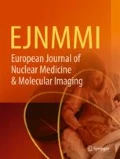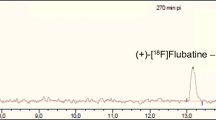Abstract
Purpose
Postmortem studies indicate a loss of nicotinic acetylcholine receptor (nAChRs) in Alzheimer’s disease (AD). In order to establish whether these changes in the cholinergic system occur at an early stage of AD, we carried out positron emission tomography (PET) with a specific radioligand for the α4β2* nicotinic acetylcholine receptor (α4β2* nAChR) in patients with mild to moderate AD and in patients with amnestic mild cognitive impairment (MCI), who have a high risk to progress to AD.
Methods
Nine patients with moderate AD, eight patients with MCI and seven age-matched healthy controls underwent 2-[18F]fluoro-3-(2(S)-azetidinylmethoxy)pyridine (2-[18F]FA-85380) PET. After coregistration with individual magnetic resonance imaging the binding potential (BPND) of 2-[18F]FA-85380 was calculated using either the corpus callosum or the cerebellum as reference regions. PET data were analysed by region of interest analysis and by voxel-based analysis.
Results
Both patients with AD and MCI showed a significant reduction in 2-[18F]FA-85380 BPND in typical AD-affected brain regions. Thereby, the corpus callosum was identified as the most suitable reference region. The 2-[18F]FA-85380 BPND correlated with the severity of cognitive impairment. Only MCI patients that converted to AD in the later course (n = 5) had a reduction in 2-[18F]FA-85380 BPND.
Conclusion
2-[18F]FA-85380 PET appears to be a sensitive and feasible tool for the detection of a reduction in α4β2* nAChRs which seems to be an early event in AD. In addition, 2-[18F]FA-85380 PET might give prognostic information about a conversion from MCI to AD.



Similar content being viewed by others
References
Bartus RT, Dean RL, Beer B, Lippa AS. The cholinergic hypothesis of geriatric memory dysfunction. Science 1982;217:408–17.
Davis KL, Mohs RC, Marin D, Purohit DP, Perl DP, Lantz M, et al. Cholinergic markers in elderly patients with early signs of Alzheimer disease. JAMA 1999;281:1401–6.
DeKosky ST, Ikonomovic MD, Styren SD, Beckett L, Wisniewski S, Bennett DA, et al. Upregulation of choline acetyltransferase activity in hippocampus and frontal cortex of elderly subjects with mild cognitive impairment. Ann Neurol 2002;51:145–55.
Bowen DM, Benton JS, Spillane JA, Smith CC, Allen SJ. Choline acetyltransferase activity and histopathology of frontal neocortex from biopsies of demented patients. J Neurol Sci 1982;57:191–202.
Whitehouse PJ, Martino AM, Antuono PG, Lowenstein PR, Coyle JT, Price DL, et al. Nicotinic acetylcholine binding sites in Alzheimer’s disease. Brain Res 1986;371:146–51.
Phillips HS, Hains JM, Armanini M, Laramee GR, Johnson SA, Winslow JW. BDNF mRNA is decreased in the hippocampus of individuals with Alzheimer’s disease. Neuron 1991;7:695–702.
Dai J, Buijs RM, Kamphorst W, Swaab DR. Impaired axonal transport of cortical neurons in Alzheimer’s disease is associated with neuropathological changes. Brain Res 2002;948:138–44.
Lindstrom J, Anand R, Peng X, Gerzanich V, Wang F, Li Y. Neuronal nicotinic receptor subtypes. Ann N Y Acad Sci 1995;757:100–16.
Martin-Ruiz CM, Court JA, Molnar E, Lee M, Gotti C, Mamalaki A, et al. Alpha4 but not alpha3 and alpha7 nicotinic acetylcholine receptor subunits are lost from the temporal cortex in Alzheimer’s disease. J Neurochem 1999;73:1635–40.
Horti AG, Scheffel U, Koren AO, Ravert HT, Mathews WB, Musachio JL, et al. 2-[18F]Fluoro-A-85380, an in vivo tracer for the nicotinic acetylcholine receptors. Nucl Med Biol 1998;25:599–603.
Winblad B, Palmer K, Kivipelto M, Jelic V, Fratiglioni L, Wahlund LO, et al. Mild cognitive impairment—beyond controversies, towards a consensus: report of the International Working Group on Mild Cognitive Impairment. J Intern Med 2004;256:240–6.
Kessler J, Calabrese P, Kalbe E, Berger F. DemTect: a new dementia screening instrument. Psycho 2000;26:343–7.
Schildan A, Patt M, Sabri O. Synthesis procedure for routine production of 2-[18F]fluoro-3-(2(S)-azetidinylmethoxy)pyridine (2-[18F]F-A-85380). Appl Radiat Isot 2007;65:1244–8.
Sabri O, Erkwoh R, Schreckenberger M, Owega A, Sass H, Buell U. Correlation of positive symptoms exclusively to hyperperfusion or hypoperfusion of cerebral cortex in never-treated schizophrenics. Lancet 1997;349:1735–9.
Sabri O, Ringelstein EB, Hellwig D, Schneider R, Schreckenberger M, Kaiser HJ, et al. Neuropsychological impairment correlates with hypoperfusion and hypometabolism but not with severity of white matter lesions on MRI in patients with cerebral microangiopathy. Stroke 1999;30:556–66.
Sabri O, Owega A, Schreckenberger M, Sturz L, Fimm B, Kunert P, et al. A truly simultaneous combination of functional transcranial Doppler sonography and H(2)(15)O PET adds fundamental new information on differences in cognitive activation between schizophrenics and healthy control subjects. J Nucl Med 2003;44:671–81.
Sorger D, Becker GA, Hauber K, Schildan A, Patt M, Birkenmeier G, et al. Binding properties of the cerebral alpha4beta2 nicotinic acetylcholine receptor ligand 2-[18F]fluoro-A-85380 to plasma proteins. Nucl Med Biol 2006;33:899–906.
Sorger D, Becker GA, Patt M, Schildan A, Grossmann U, Schliebs R, et al. Measurement of the alpha4beta2* nicotinic acetylcholine receptor ligand 2-[(18)F]fluoro-A-85380 and its metabolites in human blood during PET investigation: a methodological study. Nucl Med Biol 2007;34:331–42.
Chefer SI, London ED, Koren AO, Pavlova OA, Kurian V, Kimes AS, et al. Graphical analysis of 2-[18F]FA binding to nicotinic acetylcholine receptors in rhesus monkey brain. Synapse 2003;48:25–34.
Gallezot JD, Bottlaender MA, Delforge J, Valette H, Saba W, Dollé F, et al. Quantification of cerebral nicotinic acetylcholine receptors by PET using 2-[18F]fluoro-A-85380 and the multiinjection approach. J Cereb Blood Flow Metab 2008;28:172–89.
Innis RB, Cunningham VJ, Delforge J, Fujita M, Gjedde A, Gunn RN, et al. Consensus nomenclature for in vivo imaging of reversibly binding radioligands. J Cereb Blood Flow Metab 2007;27:1533–39.
Meyer PM, Strecker K, Kendziorra K, Becker G, Hesse S, Woelpl D, et al. Reduced alpha4beta2*-nicotinic acetylcholine receptor binding and its relationship to mild cognitive and depressive symptoms in Parkinson disease. Arch Gen Psychiatry 2009;66:866–77.
Brody AL, Mandelkern MA, London ED, Olmstead RE, Farahi J, Scheibal D, et al. Cigarette smoking saturates brain alpha(4)beta(2) nicotinic acetylcholine receptors. Arch Gen Psychiatry 2006;63:907–15.
Terrière E, Sharman M, Donaghey C, Herrmann L, Lonie J, Strachan M, et al. alpha4 beta2-nicotinic receptor binding with 5-IA in Alzheimer’s disease: methods of scan analysis. Neurochem Res 2008;33:643–51.
Tzourio-Mazoyer N, Landeau B, Papathanassiou D, Crivello F, Etard O, Delcroix N, et al. Automated anatomical labeling of activations in SPM using a macroscopic anatomical parcellation of the MNI MRI single-subject brain. Neuroimage 2002;15:273–89.
Arendt T, Bigl V. Alzheimer’s disease as a presumptive threshold phenomenon. Neurobiol Aging 1987;8:552–54.
Perry E, Martin-Ruiz C, Lee M, Griffiths M, Johnson M, Piggott M, et al. Nicotinic receptor subtypes in human brain ageing, Alzheimer and Lewy body diseases. Eur J Pharmacol 2000;393:215–22.
Nordberg A, Alafuzoff I, Winblad B. Nicotinic and muscarinic subtypes in the human brain: changes with aging and dementia. J Neurosci Res 1992;31:103–11.
Pimlott SL, Piggott M, Owens J, Greally E, Court JA, Jaros E, et al. Nicotinic acetylcholine receptor distribution in Alzheimer’s disease, dementia with Lewy bodies, Parkinson’s disease, and vascular dementia: in vitro binding study using 5-[(125)I]-A-85380. Neuropsychopharmacology 2004;29:108–16.
Rinne JO, Myllykylä T, Lönnberg P, Marjamäki P. A postmortem study of brain nicotinic receptors in Parkinson’s and Alzheimer’s disease. Brain Res 1991;547:167–70.
Nordberg A, Lundqvist H, Hartvig P, Lilja A, Långström B. Kinetic analysis of regional (S)(-)11C-nicotine binding in normal and Alzheimer brains—in vivo assessment using positron emission tomography. Alzheimer Dis Assoc Disord 1995;9:21–7.
O’Brien JT, Colloby SJ, Pakrasi S, Perry EK, Pimlott SL, Wyper DJ, et al. alpha4beta2 nicotinic receptor status in Alzheimer’s disease using 123I-5IA-85380 single-photon-emission computed tomography. J Neurol Neurosurg Psychiatry 2007;78:356–62.
Nordberg A, Hartvig P, Lilja A, Vitanen M, Amberla K, Lundqvist H, et al. Decreased uptake and binding of 11C-nicotine in brain of Alzheimer patients as visualized by positron emission tomography. J Neural Transm Park Dis Dement Sect 1990;2:215–24.
Ellis JR, Villemagne VL, Nathan PJ, Mulligan RS, Gong SJ, Chan JG, et al. Relationship between nicotinic receptors and cognitive function in early Alzheimer’s disease: a 2-[18F]fluoro-A-85380 PET study. Neurobiol Learn Mem 2008;90:404–12.
Mitsis EM, Reech KM, Bois F, Tamagnan GD, Macavoy MG, Seibyl JP, et al. 123I-5-IA-85380 SPECT imaging of nicotinic receptors in Alzheimer disease and mild cognitive impairment. J Nucl Med 2009;50:1455–63.
Yakushev I, Hammers A, Fellgiebel A, Schmidtmann I, Scheurich A, Buchholz HG, et al. SPM-based count normalization provides excellent discrimination of mild Alzheimer’s disease and amnestic mild cognitive impairment from healthy aging. Neuroimage 2009;44:43–50.
Giovacchini G, Conant S, Herscovitch P, Theodore WH. Using cerebral white matter for estimation of nondisplaceable binding of 5-HT1A receptors in temporal lobe epilepsy. J Nucl Med 2009;50:1794–800.
Terrière E, Dempsey MF, Herrmann LL, Tierney KM, Lonie JA, O’Carroll RE, et al. 5-(123)I-A-85380 binding to the α4β2-nicotinic receptor in mild cognitive impairment. Neurobiol Aging 2010;31:1885–93. doi:10.1016/J.neurobiolaging.2008.10.008.
Soonawala D, Amin T, Ebmeier KP, Steele JD, Dougall NJ, Best J, et al. Statistical parametric mapping of (99m)Tc-HMPAO-SPECT images for the diagnosis of Alzheimer’s disease: normalizing to cerebellar tracer uptake. Neuroimage 2002;17:1193–202.
Staley JK, van Dyck CH, Weinzimmer D, Brenner E, Baldwin RM, Tamagnan GD, et al. 123I-5-IA-85380 SPECT measurement of nicotinic acetylcholine receptors in human brain by the constant infusion paradigm: feasibility and reproducibility. J Nucl Med 2005;46:1466–72.
Funding
This study was funded by the University of Leipzig; there was no involvement in the study design; in the collection, analysis and interpretation of the data; in the writing of the report; and in the decision to submit the paper for publication.
Conflict of interest
None.
Author information
Authors and Affiliations
Corresponding author
Additional information
The asterisk used in the receptor nomenclature means that the receptor complex may contain additional subunits.
Rights and permissions
About this article
Cite this article
Kendziorra, K., Wolf, H., Meyer, P.M. et al. Decreased cerebral α4β2* nicotinic acetylcholine receptor availability in patients with mild cognitive impairment and Alzheimer’s disease assessed with positron emission tomography. Eur J Nucl Med Mol Imaging 38, 515–525 (2011). https://doi.org/10.1007/s00259-010-1644-5
Received:
Accepted:
Published:
Issue Date:
DOI: https://doi.org/10.1007/s00259-010-1644-5




